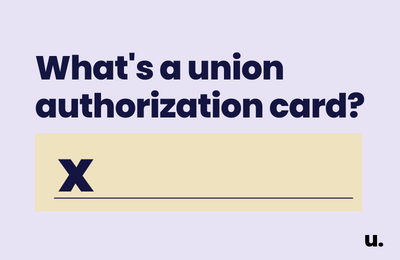When you form a union, you’ll need to eventually collect what are called authorization cards. Authorization cards can be a physical piece of paper or electronic, but their main purpose is to affirm record a worker’s support interest in union recognition.
Authorization cards are what make an organizing effort an official union campaign. By signing their name, workers are stating that they want to form a union at a specific workplace and that they want to be part of a specific union. Timing when makes most sense for card collection and how they're eventually used is a matter of strategy that should be decided among you and your coworkers.

What do they look like?
While electronic cards often look like a survey form, physical ones include the same information, but typically appear in a notecard or postcard-sized format. They’ll usually include language like:
“I hereby authorize the [union or its chartered affiliated union title here] to represent me for the purpose of collective bargaining.”
Cards will then ask for some information, often the following: name, signature, date, home address, personal email, personal phone number, job title, department.
Who should sign a card?
These are called union authorization cards because they authorize the union to bargain on behalf of the worker. This is important - authorization cards are not a request for more information or an indication that someone is interested in voting in an election. It means that they want to be represented by a union. People should only sign when their support is solid.
Where do the cards go?
If you and your coworkers can’t pressure management to voluntarily recognize your union through a process called card check (more on this below), you’ll submit cards to the National Labor Relations Board to request an election. You need a minimum of 30 percent of eligible staff to sign before submitting to request an election, but it’s more strategic to wait until you at the very least have over 50 percent of the staff on board before submitting to better your odds of winning. Most campaigns aim to collect well over 70 percent of signed cards before filing for an election.
So, what’s a card check?
Not all unions are won by election. Unions with the proper leverage can negotiate for recognition in a process called voluntary recognition in which staff and supervisors hash out the scope of the union and then submit signed authorization signatures to an agreed upon third party, like the American Arbitration Association or the Federal Mediation and Conciliation Service, who will certify the win.
Some of the reasons why a workplace organizing effort may decide to go the route of having a card check include, but are not limited to: your managers have claimed that they will remain neutral during any future unionizing campaign; or you believe the possibility of looking like a union-buster could seriously harm management’s public image i.e. you do social justice work or the organizational mission is in line with the goals of your union and they’d look like total hypocrites if they fought you.
Wait, how long does a signature last?
A worker's authorization signature lasts exactly one year from the date they signed. This is crucial for longer workplace campaigns to be aware of as it's not uncommon for efforts to occasionally stretch into the years. However, different campaigns collect auth cards at different moments. Some wait until workers have completed a series of actions (i.e. wore a button to work, went to a happy hour, signed onto a letter) before asking them to sign, while others may present cards at the outset in an effort to capture impassioned sentiments over a workplace issue like a change in a work from home policy or a recently announced pay cut.
Know that assessing union support isn't a one-off thing. Just because someone signed authorization a few months ago, doesn't mean they have the same feelings about the union today. Auth cards are a tool you can use to gauge sentiments during a snapshot in time, but they should not remain the be-all-end-all way of tracking support for the union.
Whether paper or electronic, collecting authorization cards is a key part of the process to form a union, so it would be a good idea to chat with your fellow organizers about when, where, and how you present your coworkers with them.
Still looking for more info on auth cards? Here are two additional articles in which we reference union authorization.



